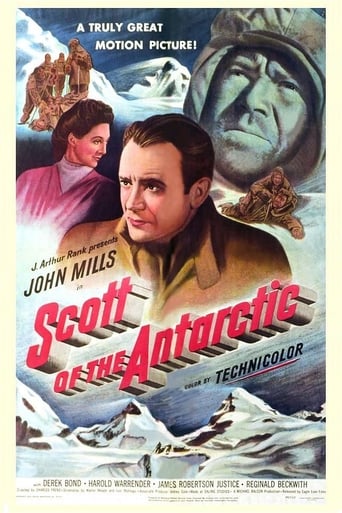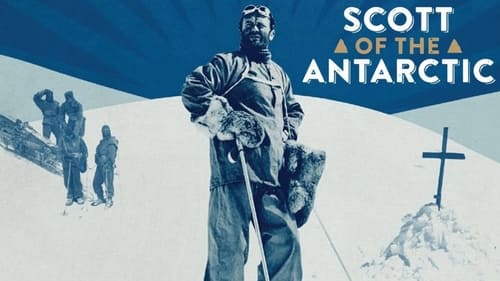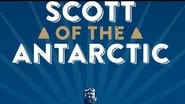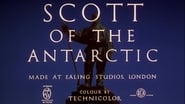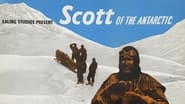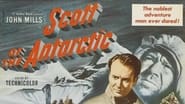Matthew_Capitano
This is the story of English explorer Robert Scott's 1912 expedition to the South Pole, perfectly portrayed by British actors, who are without a doubt, the finest actors in the world.John Mills is excellent as Captain Scott in a faithful performance which mirrors Scott's unassuming nature and sincere kindness. A fine supporting cast includes Reginald Beckwith as fellow explorer Bowers and Diana Churchill as Captain Scott's wife, Kathleen.The real-life final letters written by the party at the end of their mission are respectfully and touchingly presented capturing not only the tragedy of the moment, but also the bravery, honor, and adventuresome spirit of these great men.Majestically photographed in color in 1948. A truly beautiful film.
dougdoepke
Those windswept expanses and icy glaciers had me running for a heating pad and hot coffee right away. The movie's a harrowing account of the ill-fated Scott expedition to the South Pole. It's a prestige picture all the way, clearly vested in British national honor that was at stake in 1912. No cowards here. The men bear up bravely despite the harshest conditions possible. The movie depends greatly on a recreation of Antarctic conditions; happily, the freezing locations in Norway and Switzerland succeed, in spades. It's really hard to imagine slogging through 1000-plus miles of frozen ice and snow to reach an imaginary point on the map. But, with bone-wearying fortitude, the expedition manages, except, of course, for the return trip. Though the final tent scene remains stoically poignant, the dramatic highpoint, to me, is with the ponies. There, the harsh reality of insurmountable conditions is really driven home. Of course, those conditions are indelibly etched on the ravaged faces of the men, thanks, I suspect, to a terrific job by the make-up department.For better or worse, the movie is shorn of whatever human conflict arose in the expedition's planning and execution. In the movie, the men do get along remarkably well. All in all, it's an account minus whatever human warts there may have been. Still, if you're looking for a harrowing installment in man's eternal struggle with nature, this is a hard account to beat. But my advice is to keep a heating pad handy.
ed_two_o_nine
I have to admit that I came to this movie with very little knowledge of Scott's mission to the Antarctic and have only really found about the historical inaccuracies of the movie from reading other comments posted on IMDb. At the end of the day that is not really that important as this is not a documentary and most films based on fact are just that and they all tend to take artistic liberties with the facts. As for the film itself for 1948 it is very well shot with great use of location and props that where probably about as good as you could get at the time. John Mills gives a suitably British stiff upper lipped performance as Scott showing his upper class folly and also hinting as how Scott's drive to be first to the pole led him to make crucial errors of judgement that ultimately prove fateful. Mills ably carries the movie pretty much single handily with only minimal support form the rest of the cast, but on the whole that is a good move as it lends its self to the sense of isolation of one mans drive to battle against the elements at any cost. I would not go out of my way to watch this again, but I certainly would not avoid it.
jack_bagley
Sir John Mills is the quintessential Scott -- he even looks like the explorer in this film. The rest of the cast (Wilson, Evans, Oates, and Bowers especially) are also lookalike actors, similar to what was done in "Titanic" with the historic figures. Such movies have more "realism" to them if the actors resemble the characters they portray.The movie is flawed in that it does not present what actually happened to Scott and his party all the way through, and does "hero-ize" the explorer and his polar party members more than they deserve. The death of Evans, for instance, is done far differently than what actually occurred, but has a true cinematic heroism to it. Evans did not die in Scott's arms, in the snow, as depicted -- he actually fell into a coma and died in the tent that night. And there is a bit of a fumble with Oates' dramatic last words, but only a slight one.Scott as hero is evident in this film, and even though recent developments have reduced his stature in the eyes of the world, he should still be viewed for what he was -- a true explorer, alongside Shackleton (who does not get nearly enough of the credit he deserves), Amundsen, Peary, etc. Sure, they had their moments of being total jerks -- but don't we all?For the last eighteen years, I have used this film in my middle-school classroom as a teaching tool during a unit on Antarctica. The story of the race between Scott and Amundsen is a classic tale and deserves to be told. There are probably much more useful films that students can see about the event, but for sheer beauty (yes, I know it was shot mostly in Greenland, but some scenes were indeed filmed down south) you cannot beat Scott of the Antarctic.
